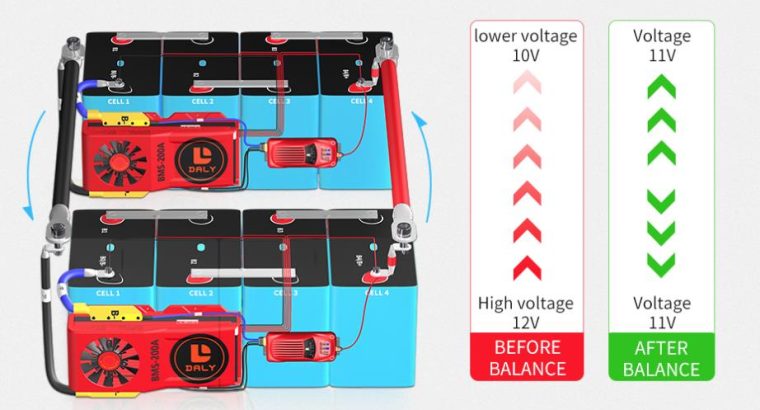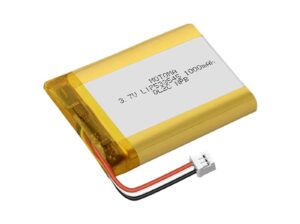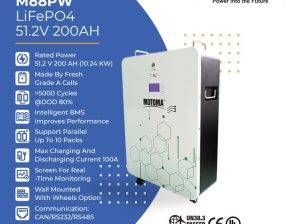Battery Management Systems: Why They’re Essential For Battery Products
Battery products, from phones to electric vehicles, are becoming increasingly prevalent in our lives. But with this increased reliance on batteries comes greater responsibility – how can we ensure that these batteries are managed safely and efficiently? That’s where battery management systems (BMS) come in. Read on to find out why they’re essential for battery products and how they can help maximize the performance of your device.
What Is a Battery Management System?
A battery management system (BMS) is a device or group of devices that monitors, regulates, and protects batteries from overcharging, deep discharge, excessive discharge current, and short circuits. A BMS also balances the cells in a battery pack to ensure each cell is evenly charged and discharged during use.
BMSs are essential for preventing damage to battery packs and ensuring their longevity. Without a BMS, batteries would be subject to more significant wear and tear and would need to be replaced more frequently. Batteries with a BMS can last up to four times longer than those without one.
BMSs are typically used in applications where batteries are subject to high temperatures, high currents, or deep discharge cycles. They are commonly used in electric vehicles, UPS systems, solar energy storage systems, and other industrial applications.
Benefits of Having a Battery Management System
A Battery Management System (BMS) is a device used to protect, monitor, and optimize the performance of a battery pack. A BMS can be used with any type of battery, including Lithium-ion (Li-ion), lead acid, nickel-cadmium (NiCd), and nickel-metal hydride (NiMH).
A BMS performs several important functions:
- Protects the battery pack from overcharging and over-discharging. This helps to prevent damage to the battery cells and extends the life of the battery pack.
- Monitors the status of each cell in the battery pack. This information can be used to detect problems such as cell imbalance, which can lead to premature failure of the battery pack.
- Optimizes the performance of the battery pack. For example, a BMS can be used to control the charging and discharging rates of the battery pack to maximize its capacity and efficiency.
Components of a Battery Management System
Most battery management systems (BMS) have three main components: the control unit, sensing and measurement circuitry, and power devices. The control unit is typically a microcontroller that monitors and controls the other two sections. Sensing and measurement circuitry includes voltage, current, and temperature sensors that provide data to the control unit. This data is used to determine when to charge or discharge the battery and monitor its health. Power devices are used to connect the BMS to the battery cells. They can be either MOSFETs or IGBTs, depending on the application.
The control unit is the brain of the BMS, monitoring data from the sensors and making decisions based on that data. It will initiate charging or discharging of the battery when necessary and protect the cells from overcharging or over-discharging. The sensing and measurement circuitry provides the control unit information on cell voltages, currents, and temperatures. This data is essential in determining when to charge or discharge the cells and monitoring their health. The power devices connect the BMS to the individual cells in the battery pack. They act as switches, allowing current to flow into or out of each cell when necessary. MOSFETs are typically used for low-voltage applications (<60V), while IGBTs are used for high-voltage applications (>60V).
Regulations and Requirements For Battery Products
The battery is one of the most important components of any electronic device. Without a properly functioning battery, the device will not work. This is why it is essential to have a good battery management system (BMS) in place for all battery products.
There are many different types of batteries, each with its specific regulations and requirements. For example, lead-acid batteries must be recycled according to the strict guidelines set by the Environmental Protection Agency (EPA). Lithium-ion batteries must be disposed of properly to avoid fires and explosions.
It is the responsibility of the manufacturer to ensure that their battery products comply with all relevant regulations and requirements. Failure to do so could result in hefty fines and/or damage to the company’s reputation.
A good BMS will consider all of these different regulations and requirements and help ensure that the battery product meets them. This can save the manufacturer a lot of time and money in the long run.
Different Types of Battery Management Systems
There are many different types of battery management systems (BMS), each with its advantages and disadvantages. The most common type of BMS is centralized, typically used in large battery packs. This type of BMS uses a single controller to manage all of the cells in the pack, making it more efficient and easier to manage. However, this type of BMS can be more expensive and complex to design and build.
Another type of BMS is distributed BMS, often used in smaller battery packs. This type of BMS uses multiple controllers, each responsible for managing a small number of cells. This can make the system more scalable and flexible, but it can also be more challenging to manage.
The choice of which type of BMS to use depends on the application’s specific requirements. There is no one-size-fits-all solution, so it’s important to work with an experienced battery management system provider to find the best solution for your needs.
How to Choose the Right BMS for Your Application
When choosing a battery management system (BMS), it is important to consider the specific needs of your application. There are many different types of BMS available on the market, each with its own set of features and benefits. To select the best BMS for your needs, you must first understand your requirements.
Your application’s power requirements will dictate the type of BMS you need. For example, if you are looking for a BMS to be used in a high-powered application, you will need a system that can handle large currents and voltages. On the other hand, if you are looking for a BMS to be used in a low-powered application, you can choose a system with lower current and voltage ratings.
The number of cells in your battery pack will also affect your BMS selection. If you have a large battery pack with many cells, you will need a BMS to manage all of these cells individually. A simpler BMS can manage a smaller battery pack with fewer cells with less functionality.
The operating environment of your application must also be considered when choosing a BMS. If your application is used in extreme temperatures, you will need to select a BMS that is designed for temperature extremes. Similarly, if your application will be used in corrosive environments, you must choose a corrosion-resistant BMS.
Once you have considered all of these factors, you can begin to narrow down the field.
Conclusion
Battery management systems are essential for battery products, as they ensure optimal performance and reliability of our devices. In addition, these systems can help extend our batteries’ life cycle, reducing waste and saving us money in the long run. With their ability to monitor temperature, voltage, current, and other parameters, battery management systems provide an invaluable service to all companies that
Comments (20)
You must be logged in to post a comment.




[…] to PV magazine, several affected PV system owners have reported outages. The battery management system unit must be replaced if the storage devices […]
[…] continues to play an increasingly important role in the electricity grid, the importance of the BMS will only continue to […]
[…] storage is an essential component of a modern energy system, allowing electricity to be stored and used when it is most needed. The type of technology used for […]
[…] consist of solar panels, inverters, batteries, and other components. Ground fault protection is essential in these systems because they involve high DC voltage and current levels that can pose a significant safety hazard […]
[…] are essential in protecting electrical equipment and systems from voltage surges. They come in several types, including Type 1, Type 2, and Type 3, each with […]
[…] environment and to prevent damage due to overloads and short circuits.Overall, DC MCBs are an essential component in any DC electrical system, providing reliable protection against overloads and short […]
[…] storing and maintaining batteries is essential for achieving their maximum energy potential. The following best practices should be followed to […]
[…] way is to use a battery management system (BMS). A BMS is a device that monitors the SoC and DoD of a battery and controls the charging and […]
[…] battery that use a polymer electrolyte instead of a liquid electrolyte. Ultra thin LiPo batteries are essentially thin, flexible, and lightweight LiPo batteries that are designed to be used in portable electronic […]
[…] feedback is essential to improving collaboration and productivity. Organizations should provide employees with regular feedback on their performance, including […]
[…] Consider the Battery Management System: If your application requires a battery management system, you must select a battery that is compatible with the […]
[…] Battery management system: The battery management system must be designed to monitor and control the charging and discharge of the battery pack, as well as […]
[…] the realm of mobile technology, LiPo batteries are used in a variety of products, including smartphones, tablets, laptop computers, and wearable devices. They are also used in many […]
[…] To ensure quality, businesses should conduct regular tests and inspections, implement quality management systems, and use quality control […]
[…] IEC 60086-1 plays a crucial role in the battery industry by providing guidelines for primary batteries’ production, performance, and safety. These standards help manufacturers produce high-quality batteries that […]
[…] and mitigate the risks associated with high temperatures. These features include robust thermal management systems, improved cell designs, and enhanced electrolyte formulations that reduce the likelihood of thermal […]
[…] of high energy density batteries can have a significant environmental impact. This is because the production of these batteries often requires the use of rare and toxic materials, such as cobalt and lithium. In addition, the […]
[…] Management System: Battery management systems (BMS) can also impact the DOD of a battery. A well-designed BMS can help ensure that the battery is […]
[…] Importance of Battery Management […]
[…] wall mountable 51.2V 200Ah LiFePO4 battery pack incorporates an intelligent Battery Management System (BMS). The BMS continuously monitors and manages various battery parameters, including voltage, […]